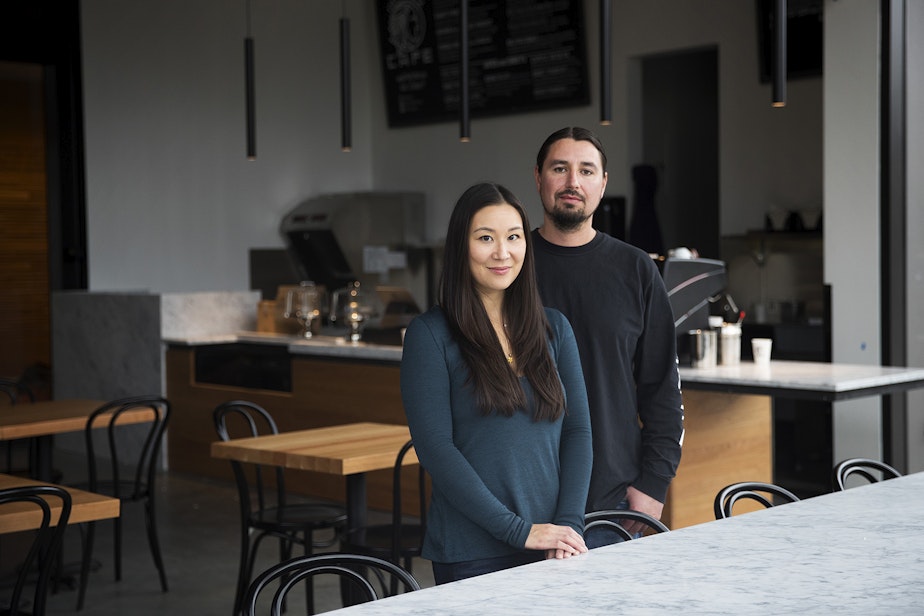A Native-inspired café opens at Burke Museum. There will be frybread

You can’t miss the Off the Rez food truck with its bright blue and purple mural.
Inside, Cecilia Rikard is cooking up Swiss chard and collard greens with caramelized onions.
“They’re going to go as part of our wild rice bowl,” she says.
The rice bowl will be served with braised bison, smoked barbecue pork or seasonal vegetables.
This Native-inspired food will be on the menu at the Burke Museum, where Off the Rez is launching its first brick and mortar restaurant. The museum reopens this weekend.
Rikard and her partner Mark McConnell own and operate Off the Rez, Seattle’s first and only food truck offering Native American food.
There will be frybread, too, which McConnell stretches before dropping into a fryer. The dough immediately puffs up and in short time turns golden brown.
Sponsored
What goes with fry bread is up to you. Topped with beef or chicken chili, it becomes a taco. With sweet jam, it’s a dessert.
With all the variety of food available these days, McConnell says he wanted to see the food he grew up with in the mix.
“My mother is from the Blackfeet Reservation in Montana,” said McConnell. “We decided to open the truck with food that otherwise isn’t available and especially being on Native lands, I thought it was important to represent our food.”
Native American food depends on where tribes are located.
Sponsored
“Salmon is very common to the coastal areas, but back in Montana it was more buffalo, but it was foraged locally,” said McConnell.
In their research, they also learned that corn is big staple in their cuisine. But the ingredients varied based on where the tribe was located, Rikard says.
“A tribe might not just sit and stay in one place. Of course, this is about pre-colonial times," she says. "Their diet would’ve varied based on where they were located that day or week.”
The food truck’s menu are based on recipes from McConnell’s family, with some tweaks.
“My grandma would make different kinds of dishes using vegetables that were fresh and local,” said McConnell. “So we would take a recipe of hers and tweak it a little bit, like our quinoa salad and our kale salad would often take bits and pieces of dishes she would make with an updated spin on.”
Sponsored
For the Burke Museum café, Rikard says there will be opportunities to explore dishes before and after colonial times.
“We will have some of our traditional staple items like our frybread, but we’re also going to do really fun stuff like wild rice bowls with braised bison," she says. "Those are more like the traditional ingredients you would’ve seen before government rations came in.”
The federal government issued ration cards in the late 19th century as tribes were forced into reservations. Tribes no longer had access to their traditional hunting and fishing grounds. For food, they received rations of flour, lard and sugar. Many of those ingredients would be moldy.
It would change the diet of Native people.
Despite frybread’s dark story, McConnell says they’re still served at powwows, family gatherings and special occasions.
Sponsored
“In general, throughout Native culture, we’re kind of proud that we were able to take what they gave us and make something delicious out of it.”
The frybread is coming out of the fryer. They’ll get a savory or sweet filling.
McConnell says they’re excited to work with the museum to explore foods of early Native Americans through some of the exhibits.
For McConnell, to operate the café at the Burke is somewhat personal.
“Growing up in Seattle, I would go on field trips to the Burke museum every few years and I ended up going to the University of Washington so it doubly makes me happy to do it and really proud.”




